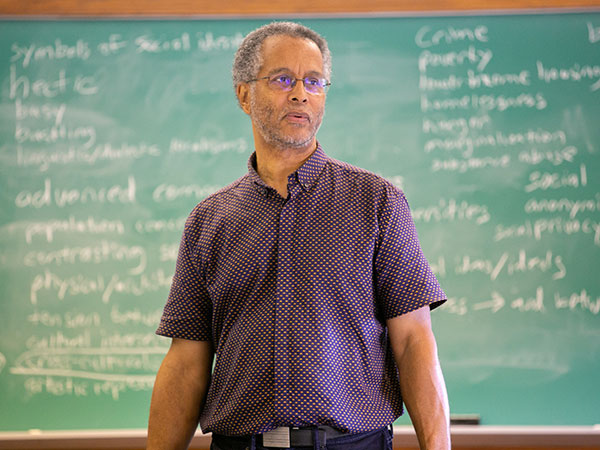The “Inside the PTS Curriculum” series gives you an inside look at what students are learning in their courses at Pittsburgh Theological Seminary. Each article focuses on one class, its subject matter, what students can expect to learn, the required texts, and the kinds of assignments students can expect. We’ll let you know whether the course is required or available for the Master of Divinity (MDiv), the Master of Arts in Pastoral Studies (MAPS), or Master of Theological Studies (MTS). Each article will include the professors’ bio.
This week’s course is: “Pittsburgh Social and Religious Ecology.”
About Pittsburgh Social and Religious Ecology
During this term, Pittsburgh Theological Seminary students will be learning from the Rev. Dr. R. Drew Smith about class “Pittsburgh Social and Religious Ecology.” This course is available for students in the Master of Divinity (MDiv) degree, Master of Arts in Pastoral Studies (MAPS) degree program, and open to students in the Master of Theology (MTS) degree program.
This course will examine the Pittsburgh metropolitan region, which has embodied in important ways America’s early settler adventures, difficult race relations, industrial revolution, labor strife, urban decline and redevelopment, and an evolving religious culture. Utilizing historical, sociological, and theological readings as well as lectures from key, local experts and informants, the course explores Pittsburgh’s metropolitan ethos and the role of churches in the formation and maintenance of metro-Pittsburgh’s social and religious culture. Observational and analytical tools acquired in this course will readily transfer to interpretation and analysis of local social and religious contexts beyond the metro-Pittsburgh context.
By the end of the course, students will be able to undertake systematic examinations of metro-Pittsburgh’s socio-historical and religious formation and conduct theological and social analysis of select historical and contemporary events and social problems. They will learn strategies for effective ministerial and social responses to these social problems and reflect on the role of ministers as social analysts and activists and on boundaries between prophetic and priestly obligations. They will grow in their ability to delineate and critique contemporary activist ministry frameworks and their underlying definitions of community and of Christian calling. The course will also provide students with direct (in-person) and indirect (literary) exposures to contemporary embodiments of socially-engaged ministry.
Assignments include class attendance and participation, along with four discussion papers. Required reading includes Samuel P. Hayes, City at the Point: Essays on the Social History of Pittsburgh; John E. Bodnar, Roger Simon, and Michael P. Weber, Lives of their Own: Blacks, Italians, and Poles in Pittsburgh, 1900-1960; W. Trotter and N. Day, Race and Renaissance: African Americans in Pittsburgh since World War II; and R. Drew Smith, Stephanie C. Boddie, and Ronald E. Peters, eds., Urban Ministries Reconsidered: Context and Approaches.
About the Instructor
Both a political scientist and a clergyman, the Rev. Dr. R. Drew Smith has initiated and directed a number of projects related to religion and public life which have collected research data on political involvements, community development activities, and outreach ministries of churches, especially African-American churches. He has also conducted similar research in South Africa, including while serving in 2005 as a Fulbright professor at the University of Pretoria. His overseas involvements additionally include serving in 2009 as a Fulbright senior specialist at Presbyterian Theological Seminary in Cameroon and lecturing in many international venues including as part of the U.S. State Department’s Speakers Bureau. He has served since 2010 as co-convener of the Transatlantic Roundtable on Religion and Race, an initiative that convenes scholars, religious leaders, and community activists from across the transatlantic region for purposes of advancing progressive approaches to persistent racial problems in various contexts. An ordained a Baptist clergyman, Professor Smith is a graduate of Indiana University and Yale University.

